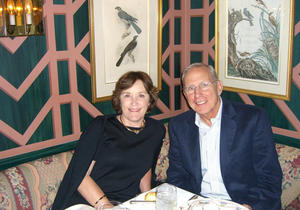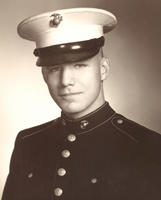Brooks and Almena Pettit make gift to World War II Institute

Almena and Brooks Pettit
Brooks Pettit didn’t attend FSU as a student, but during 20 years of retirement spent in Tallahassee, his life has been touched in many ways by the university.
Pettit and his wife, Almena, a Tallahassee native, have given back to FSU over the years with many gifts of both time and money. And they’ve recently decided to do so again, this time by supporting the Institute on World War II and the Human Experience with a deferred gift of $122,000.
“My hope is that the World War II Institute becomes a little bit more visible, and I mean that in terms of not just print and advertising,” he says. “I’d like to see the start of an effort to get it situated in a place where it can be appreciated. I think an awful lot of people don’t know what it is or where it is.”

Brooks Pettit served in the U.S. Marine Corps
Pettit served in the U.S. Marine Corps in the late ’50s and comes from a family with a history of service. His older brother and father-in-law both served in World War II, and his father and uncle served in World War I. More recently, his sons have also served in the military. For Pettit, supporting the institute means keeping the memory and significance of World War II alive in younger generations.
“I’d like people to appreciate what was done then by those kids—and they were kids,” he says. “A lot of them died and they didn’t want to die, and that can get lost in history.”
Pettit spent most of his military service at Camp Lejeune in North Carolina, and is grateful that he never saw serious combat during his service. Still, he remembers being sent overseas in 1958 with the possibility of fighting hanging over his head and the effect that possibility had on him.
“We went to Lebanon,” he recalls. “There was a big mess over there. I was 18 years old. I didn’t even know where Lebanon was … It was a very sobering event because all of a sudden you went from being a tough young kid who didn’t know much about anything to somebody who thought he was going to be in a lot of trouble. And we got very quiet very quickly when we thought we were going to go into a combat situation.”
Once Pettit’s military service ended, he returned to school at Harvard and studied German language, literature, and history. He loved his studies and, after finishing grad school, went on to become a teacher. Eventually, he wound up at the same independent school that he graduated from himself in Belmont, Mass., where he worked in admissions and financial aid while also teaching English.
It was while he was working in Belmont that he met Almena.
“She was working at Dartmouth, and a classmate of mine lived in the town she lived in and knew her,” he says. “He invited me to join him for a weekend. I didn’t know I was going up to meet anybody else, but he invited me trout fishing, and I’d go anywhere to trout fish. All of a sudden he announced that we had dates that night, and the rest is history.”
They remained in Belmont until Pettit retired about 20 years ago. Then, they moved to Tallahassee, and fell in love with all FSU offered the community. The Pettits still regularly attend theatrical and musical productions, athletic events, and the Flying High Circus.
The Pettits were keenly aware of just how much FSU contributed to the quality of life for Tallahassee residents, and started supporting their favorite cultural institutions such as the School of Theatre. That appreciation for what FSU offers the community has led them to adopt the university as their own in many ways and has driven their desire to support it.
“When somebody simply presents you with something and you go and enjoy it, it deserves your support,” Pettit says. “We tend to be much more involved with FSU than we are with either one of the colleges we went to, for the very reason that we are in the community and we appreciate what the university does.”
Additionally, Pettit notes that at his 50th reunion at Harvard this past spring, the president of the college announced that the Class of ’61 had set a record: The class gift totaled $61 million.
“All that went through my mind was how needed and appreciated that gift from one class would have been at Florida State, and how hard the university works to raise funds,” Pettit says. “For Harvard it was, relatively, the proverbial drop in the bucket.”
The Pettits’ gift will certainly be more than a drop in the bucket at the World War II Institute.
“This generous gift helps us save priceless documents from World War II veterans and makes them available to future generations of students, scholars, and members of the general public,” says G. Kurt Piehler, the institute’s new director. “This financial support will enable the institute to develop a number of new initiatives to ensure the letters, diaries, and other documents are used by historians in the writing of the history of World War II and are studied by students from high school through graduate school.”

